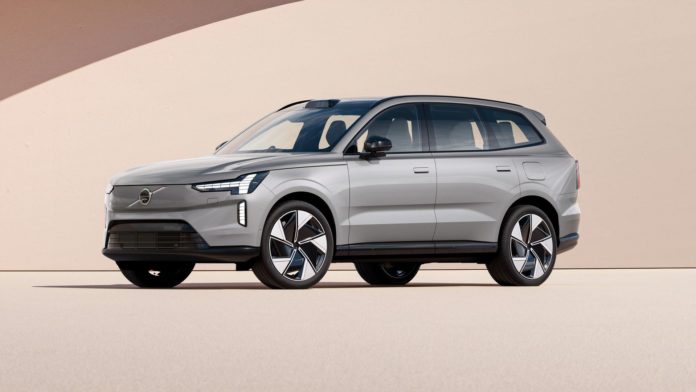Key Takeaways
- Volvo is the first to introduce “battery passports” for EVs, creating a digital footprint years before the 2027 EU mandate.
- Battery passports are similar to real passports, showing battery and carbon footprint info with Volvo holding the data for 15 years.
- The technology could come to the US, standardizing data and tracking battery components for consumer ease and government incentives.
Volvo will soon be the first automaker to integrate battery passports into its vehicles when the EX90 SUV goes into production. Speaking to Reuters, the company said the technology was developed in partnership with the UK startup Circulor. It creates a permanent digital footprint for your vehicle ahead of the 2027 EU deadline mandating the technology.
2025 Volvo EX90
- Base MSRP
- $76,695
- Engine
- Electric
- Horsepower
- 496 hp
- Torque
- 671 lb-ft
- Drivetrain
- All-Wheel Drive
Audi and Tesla, in collaboration with the Global Battery Alliance, proved that the concept was viable last year, and ever since there’s been a rush to see which automaker would introduce it first. If it proves to be as effective as the EU believes it will be, then it’s possible we could see something similar to it in the US in the next few years.
What Is A Battery Passport?
A battery passport is actually quite similar to a real passport, as it shows where a vehicle has been, in addition to other critical information. The EU is mandating that they display the composition of batteries and their origins, the carbon footprint of the vehicle, and the recycled content. In addition to this, Volvo is also including information on the state of your vehicle’s battery, giving used buyers an accurate idea of how much life their vehicle has left when purchasing. Volvo will hold on to battery health info for 15 years at a cost of $10 per vehicle.

Add CarBuzz to your Google News feed.
The goal of this technology is standardization that can easily be audited so lawmakers and government agencies can track information vital to the transition to carbon neutrality with the Euro 7 regulations. Circulor’s system uses the blockchain to track the raw materials for the finished product and has encouraged Volvo rethink how it runs its business to make this tracking possible.
Coming To The US?
A system such as this is good for consumers and governments. Buyers of products like the EX30 will be able to scan a QR code on the door which will give them access to all sorts of information that will make selling it much easier, taking the hassle out of what is essentially a guessing game at the moment. The last thing anyone wants is to purchase a used EV only to have to replace the battery a year later to the tune of $15,000.

Automakers Sourcing Graphite In China Score Massive Tax Credit Extension
Companies can continue to source graphite there until 2027 and still qualify for the credit.
The US government is also incentivized to make a system like this mandatory because it will allow it to better track battery component percentages that are needed to determine if a vehicle qualifies for the IRA EV tax credit. These percentages are set to get stricter every year as we approach 2030, making it harder for automakers to qualify and more likely they’ll attempt to find loopholes around the rules, making tracking that much more crucial.
Source:
Reuters




